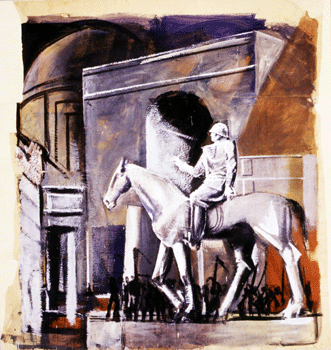Solomon R. Guggenheim Museum
1071 Fifth Avenue (at 89th Street)
New York City
http://Guggenheim.org/education

This November, an exciting schedule of programs will take place at the Solomon R. Guggenheim Museum, New York, including the following:
Lectures
Scultura Lingua Morta: Sculpture’s Forbidden Languages
Penelope Curtis
Director, Tate Britain
Wednesday, November 10 @ 6:30 pm
The trauma of World War II is often discussed today in terms of its impact on our cultural memory, but an aspect that has gone largely unremarked is the way in which the rise of the totalitarian state affected the subsequent history of sculpture. Comparing the postwar reputations of artists such as Lucio Fontana, Marino Marini, and Henry Moore, Penelope Curtis, director of Tate Britain, will offer observations on the affects of totalitarianism in these artists’ work, including the push toward abstraction, and consider how their work is best understood in terms of what came immediately before the war. Curtis will draw on her experience as curator for Taking Positions (2001) and Scultura Lingua Morta (2003), two exhibitions at the Henry Moore Institute, Leeds, UK, which brought rarely, if ever, seen works from Fascist Italy and Nazi Germany into public view.
For tickets: http://guggenheim.org/publicprograms
23rd Annual Hilla Rebay Lecture
Objects as Sculpture
Elizabeth Cowling
Honorary Fellow, History of Art, University of Edinburgh
Tuesday, November 16 @ 6:30 pm
Shortly before World War I, when Umberto Boccioni, Georges Braque, and Pablo Picasso began to sculpt objects and still-life compositions, they set in motion a revolution, the repercussions of which can still be felt in the work of many of today’s leading sculptors. Soon afterward, Marcel Duchamp launched his assault on the very foundations of art with his found-object readymades. In this year’s Hilla Rebay Lecture, Elizabeth Cowling focuses on a pivotal period in the history of modern sculpture when the object, rather than the human form, assumed the role of agent provocateur. The Hilla Rebay Lecture brings distinguished scholars to the Guggenheim Museum to examine significant issues in the theory, criticism, and history of art. This annual program is supported by the Hilla von Rebay Foundation. Free on day of lecture (no advance ticket registration).
Film Screening
The Blood of a Poet (Le sang d’un poète), (1930)
Directed by Jean Cocteau
Fridays, November 5, 12, and 19 at 1 and 2:30 pm
The first installment in the Orphic Trilogy—a series of three films by acclaimed French avant-garde director Jean Cocteau—this groundbreaking first film is one of cinema’s great experiments. A portrait of the plight of the artist, the film utilizes surrealist imagery to explore the poet’s obsessions with the relationships between art and dreams, metaphor and reality, and life and death. French with English subtitles. Free with museum admission.
Tours
Mind’s Eye: Chaos and Classicism (part II)
Monday, November 8 @ 6:30 pm
Separate programs for the partially sighted, blind, and deaf visitors through Verbal Imaging, touch, and ASL. Free. Registration required at access@guggenheim.org or 212 360 4355.
Curator’s Eye
Friday, November 5 @ 2 pm
Megan Fontanella, Broken Forms: European Modernism from the Guggenheim Collection
Friday, November 12 @ 2 pm
Helen Hsu, Chaos and Classicism: Art in France, Germany, and Italy, 1918–1936
Friday, November 19 @ 2 pm
Katherine Brinson, Intervals: Ryan Gander
Free with museum admission

